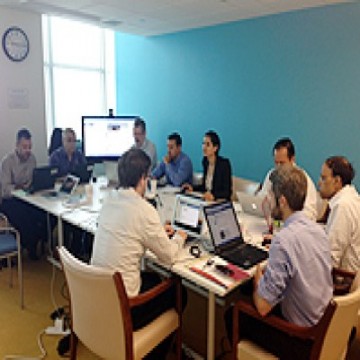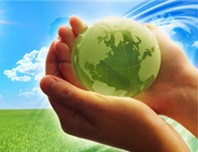August | 2013 | DESANews - United Nations Department of Economic and Social Affairs
Food, Energy and Cities discussed online with DESA experts

As a way to bring United Nations reports closer to the general public, eight experts from DESA held a Facebook chat on 25 July to promote the recently launched World Economic and Social Survey 2013. Here are some of the questions and issues raised from all around the globe and an overview of the report.
During two hours, on 25 July, eight experts from the Development Strategy and Policy Analysis unit (DSP) of DESA's Development Policy and Analysis Division (DPAD) sat in a Conference room at UN Headquarters in New York with an unusual goal: discussing with the public online about the recently launched World Economic and Social Survey 2013. The event enabled the team to reach a wider audience, and to get a sense about the thinking and understanding of sustainable development issues across a wide and varied non-specialist audience.
Survey seeks to promote innovative strategies
The World Economic and Social Survey 2013 (WESS 2013) is the annual United Nations survey of global development issues. This year it focuses on three major challenges that will have to be addressed to achieve sustainable development, in particular food and nutrition security, energy transformation and the sustainability of cities. For each of these challenges, particular solutions were identified to achieve sustainable development.
According to the Survey, the vision of promoting economic and social wellbeing while protecting the environment has not been achieved. This is due to gaps and shortfalls in development partnerships, rapid growth of population and urbanization, rising inequality, climate change and unsustainable patterns of production and consumption leading to environmental degradation.
The WESS 2013 establishes that letting things go as they are now in those three areas is not an option. Formulating and adopting a comprehensive but focused set of sustainable development goals (SDGs), as currently debated in the General Assembly's Open Working Group on SDGs, will be a critical first step towards addressing the challenges.
For example, to address rapid urbanization will require multilevel planning and cooperation at local and national levels and partnerships to mobilize public and private resources. Without innovative strategies to integrate economic, social, and environmental aspects, there is a serious risk that the number of people living in slums and lacking access to basic infrastructure and services such as sanitation, electricity, and health care may dramatically rise from one billion now to three billion by 2050.
Innovative strategies will be needed to attract the major investments to promote sustainable development. 'We have to take actions now that will enhance the benefits of cities, while reducing the threats to sustainable development', said Wu Hongbo, United Nations Under-Secretary-General for Economic and Social Affairs at the time of the launch of the WESS 2013.
Facebook brings participants from diverse backgrounds together
The panel of experts comprised the members of the WESS 2013 core team: Willem van der Geest, Chief DSP and Nazrul Islam, Nicole Hunt, Alex Julca, Marco Sanchez-Cantillo, Oliver Schwank, Sergio Vieira and Eduardo Zepeda. The WESS 2013 team engaged with a total of 315 people from across the globe.
Participants were from very diverse geographical and professional backgrounds: young professional from developing countries, seasoned professionals, university students and researchers, and civil society organizers and activists. The team engaged with young professionals, typically in their mid-twenties, from Kenya, DRC Congo, Nigeria, Afghanistan, Sri Lanka, Pakistan, India, Thailand and elsewhere. Seasoned professionals, sometimes presenting their own publications and research results, were online from India as well as across Europe and North America. University students and researchers were online from Europe, India, Pakistan, Bangladesh, Canada and elsewhere. Civil society organizers and activists were the most varied group, ranging from those advocating training for young women in Africa, to a school teacher from Zambia, to a women’s network in New York.
Issues raised remained largely within the confines of the pre-identified topics (environmental sustainability, food and nutrition security, energy transformation, sustainable cities, sustainable development in general) and included pertinent questions about the relation between MDGs and SDGs, plans and programmes for Africa, the proposed approach to the global commons and desertification, the scope for sustainable development in conflict-zones, and energy transformation. Some participants provided comments and opinions, and even answers, rather than questions.
How does the UN address sustainable development?
Regarding sustainable development, Nahid Khan from Dhaka asked 'Bangladesh is a developing country and it has many sustainable problems like transportation, food security, and energy transformation. How does the UN address these problems?'
The experts recognized the challenges that this country is facing in terms of sustainability, and showcased ways in which the UN can help: 'One way is by providing ideas and suggested policies that can be helpful. The second way is by providing fund and project implementation expertise through UN funds and agencies such as UNDP. For example, UNDP financed the “Sustainable Environment Management Project (SEMP)” in Bangladesh. It is a big project in support of Bangladesh’s pro-environment efforts'.
Reducing waste or increasing productivity?
João Saraiva Gomes from Portugal was worried that the goal to boost by 70% the agricultural production before 2050 might only partially be achieved. He wanted to know more about the role of food waste as a tool to reach food security 'technically what is easier to do: reducing waste or increasing productivity?'
The experts answered that 'reducing waste and increasing agricultural productivity are both important. Addressing only one of these two issues would not be sufficient and may not be recommended. For example, reducing food waste at the household level will require important consumption changes that may take some time. You are totally right, changing market quality standards and conservative expiration dates are some of the measures to reduce food waste'.
Youth employment as a sustainable development goal?
On youth unemployment Sayeed Mohammed (from Qatar) asked youth unemployment which is going to remain a pivotal issue. He noted that '..ILO is pushing to make employment and livelihood security as one of the sustainable development goals. How do you see, it is happening?'
The experts noted that 'There is widespread agreement that employment is absolutely critical for development. It is the most successful and proven way to reduce poverty. So it is very likely indeed that there will be a strong focus on employment generation, especially for youth – in a post-2015 development agenda and the SDGs.'
Can sustainable development start at home?
On sustainable development in their own region Badmus Quam from Africa asked:
'What plan, policy and social/economic framework do you have for Africa?'
The experts explained that 'In our World Economic and Social Survey 2013, we take a global perspective and do not focus on countries or regions specifically. But the challenges for sustainable development that we address are all extremely relevant for Africa – in urbanization, food security, or energy. At the same time, Africa has a socio-economic framework for itself, in the form of NEPAD (the New Partnership for Africa’s Development) under the African Union.'
On sustainable cities, Berta Polo Lorenzo, from Spain, asked a very to-the-point question to the team: 'how can citizens improve sustainable development in their home towns?'
The experts answered that 'initiatives led by community organizations can be more effective than individual initiatives. But it can start at home and then move to the community level in dialogue with neighbors. Community gardening, reducing and classifying waste, are examples of micro initiatives'. The experts guided Berta to find successful experiences in this area in the journal 'Environment and Urbanization', available online for free.
Understanding the public's concerns
For Sergio Vieira, “the opportunity to answer interesting questions from people all over the world was both fun and informative. It was helpful to understand their concerns and their motivation in participating in local activities that can contribute to sustainable development.”
“A Facebook chat is teamwork. Answering hundreds of questions in two hours requires true coordination, to make sure that each is addressed by the right person”, said Willem van der Geest.
A new statistical standard to measure sustainable development

The System of Environmental-Economic Accounting (SEEA), an international standard on statistics, was recently agreed among UN Member States, and is currently being implemented. The aim of this standard is to report on the interrelationships between the economy, the environment, and the society through clear, concise and coherent statistics and indicators.
The SEEA became a statistical standard in 2012. It is the second existing statistical standard, after the System of National Accounts (SNA).
One of the main aims of a statistical standard is to provide an agreed set of definitions and concepts for use in collection, compilation, and analysis of data. A benefit of using such a standard is the ability to develop internationally comparable indicators, (e.g., GDP in the case of the SNA).
Information compiled using the SEEA framework relates the environment to the economy, bringing together statistics of supply and use of resources in physical and monetary terms. Policy relevant indicators can also be derived from the SEEA framework. Examples of such indicators include natural resource use intensity by industries, emissions to air, and water use intensity.
Countries that adopt the SEEA and use it in their statistical production processes are able to consistently monitor environmental-economic interactions. The outputs of this monitoring can better inform policy-makers considering initiatives related to the economy and environment.
Implementation of the SEEA does not require a large amount of data; on the contrary, most countries already collect enough data for the compilation of accounts at an aggregated level.
A revolution in statistics
“It is a revolution in statistics! This system is the only one that takes into account the link between economic and environmental statistics (…) and that integrates a perspective of sustainable development while focusing on areas of economics, environment and human activities”, says Alessandra Alfieri, Chief of the Environmental and Economic Accounts Section of DESA’s Statistics Division.
For example, the environmental protection expenditure accounts provide information on all goods and services directed toward environmental protection, such as expenditure on waste management by government and expenditure on protection of biodiversity of non-profit organization.
Change the mindset
The “Global Implementation Programme for the SEEA” International Conference held in New York on 17-19 June showcased experiences from countries that are already working on the SEEA implementation in order to assist countries that are starting or continuing the implementation of this new statistical standard. Representatives from 35 countries attended the Conference, which was chaired by Peter Harper, Chairman of UN Committee of Experts on Environmental Economic Accounting and Deputy Australian Statistician.
Since the SEEA is a new standard, the conference discussions highlighted the need to build the statistical infrastructure and to train people to produce standardized statistics.“The challenge is also to change the mindset, from isolated statistics work to collaboration and integration”, pointed out Alessandra Alfieri. In the past, the integration of economic and environmental data was not possible in many countries due to the lack of a coherent conceptual framework. Different agencies in a country are often, for example, collecting data on water, yet are using different concepts and definitions. One of the major goals of the SEEA implementation, and a point stressed during the conference, is fostering of institutional arrangements for the production of integrated statistics.
Address the countries’ needs
Another major point raised at the Conference was adjusting the SEEA to the regional approach, thereby serving the countries’ and regions’ needs. Country policy priorities and progress towards meeting those priorities have to be evaluated in global processes such as the post-2015 development agenda.
The participating countries emphasized the need to build South-South and North-South cooperation partnerships, in order to let the countries that are most advanced in the SEEA implementation guide their neighbors. For example, some of the regional leaders like Colombia (for the Andean region), Brazil (rest of South America), Mexico (for Central America) and Jamaica (for the Caribbean region) have offered to lead the implementation of the SEEA in their particular regions. On the other hand, Australia plays a significant role in North-South cooperation by helping countries all over the world.
Bring together statistics producers and users
Participants also discussed the role of governance in the implementation process and how to include relevant international, regional and sub-regional agencies in coordination with local governments. “It is important to bring together producers and users of statistics” Alessandra Alfieri said. Results from the work on the SEEA implementation also need to be communicated to provide decision makers with relevant, accurate and comparable statistical information. This critical communication can allow them to implement better public policies. Similarly the general public and media should receive information about the SEEA and its implementation to allow a better understanding of the importance of standardized statistics.
The multidimensional nature of the sustainable development agenda requires an integrated and balanced information system covering economic, environmental, social and human aspects that employs clear, concise and coherent statistics and indicators for monitoring and reporting. The SEEA is one of the fundamental tools that can aid in properly measuring progress towards sustainable development, informing users of the interactions between the economy and the environment.
What’s Next?
Peter Harper, Chair of UNCEEA and deputy of Australian Statistics, said that the next steps would be to “turn the plan that we have been discussing together into action, and reach a better implementation of SEEA while progressing in its results”. Integrated information allows for more comprehensive analysis and gives policy makers the necessary tools for improved policy making.
The participating countries agreed to produce and share training material with the less advanced countries, and a document summarizing conference outcomes will provide the basis for the formulation of recommendations to the UN Statistical Commission at its 45th session in March 2014.


